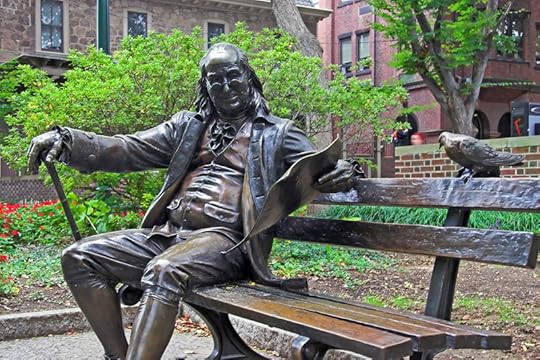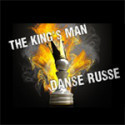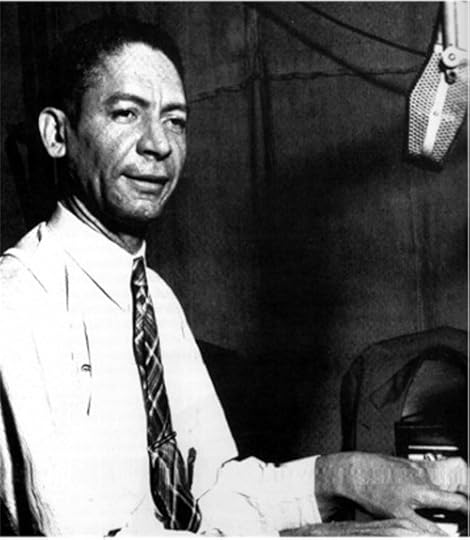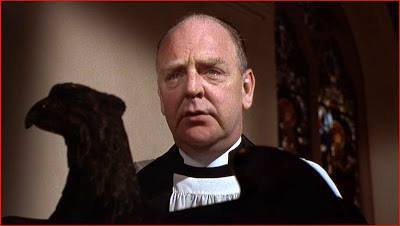Terry Teachout's Blog, page 53
September 30, 2013
TT: Lookback
From 2003:
Read the whole thing here .
I should start by addressing a half-truth, which is that the point of a Rothko, or any other work of art, is the way it looks, not who made it. Art connoisseurs have a phrase for people who get those two things confused: such benighted folk "buy signatures," which is one baby step up from collecting autographs....
Read the whole thing here .
Published on September 30, 2013 20:21
TT: Synchronicity
 Contrary to the impression left by my recent postings, I do have another life in which the impending publication of
Duke: A Life of Duke Ellington
plays a purely peripheral part. Today, for instance, I'm flying to Louisville to rehearse the premiere production of The King's Man, my latest operatic collaboration with
Paul Moravec
, in which we tell the tale of the stormy relationship between Benjamin Franklin and his illegitimate son William, who opposed one another in the Revolutionary War (William, the royal governor of New Jersey, was a British loyalist).
Contrary to the impression left by my recent postings, I do have another life in which the impending publication of
Duke: A Life of Duke Ellington
plays a purely peripheral part. Today, for instance, I'm flying to Louisville to rehearse the premiere production of The King's Man, my latest operatic collaboration with
Paul Moravec
, in which we tell the tale of the stormy relationship between Benjamin Franklin and his illegitimate son William, who opposed one another in the Revolutionary War (William, the royal governor of New Jersey, was a British loyalist).It is--to put it mildly--somewhat disorienting to have an opera going into production just as you're preparing to publish a book. But I've been there before: The Letter, my first collaboration with Paul, was premiered by the Santa Fe Opera one month before Pops: A Life of Louis Armstrong went to the printer, a coincidence that took at least a week off my life. So I know how to cope, insofar as coping is possible under such lunatic circumstances.
 The King's Man is being presented by Kentucky Opera as part of a double bill that also includes the first revival of
Danse Russe
, our backstage operatic comedy about the making of The Rite of Spring, which was premiered two years ago in Philadelphia.
The King's Man is being presented by Kentucky Opera as part of a double bill that also includes the first revival of
Danse Russe
, our backstage operatic comedy about the making of The Rite of Spring, which was premiered two years ago in Philadelphia.Needless to say, I'll be telling you a lot more about The King's Man between now and opening night, which is set for October 11. In the meantime, though, go here to buy tickets and here to read synopses of the two operas and a short essay that I wrote earlier this year about The King's Man.
See you in Kentucky!
Published on September 30, 2013 20:21
September 29, 2013
TT: The Linda Ronstadt challenge
Christopher Lydon recently interviewed Linda Ronstadt, extracting from her a
list
of thirteen "singers and songs--the personal favorites, the masterpieces, the ones we called 'pop' and 'love songs' that may last as long as Schubert and Brahms." He challenged me on Facebook to come up with a similar list of my own. Here it is.
This is not, mind you, a list of my favorite songs, or my favorite singers (though some of both made the list). It's nothing more--or less--than a list of fifteen performances that have particular personal meaning for me. It ranges much more widely than I expected when I first started drawing it up, encompassing everything from a down-home Delta blues to a pair of songs written in languages that I don't speak:
• Black Crow (Joni Mitchell, performed by Diana Krall)
 •
Car Wheels on a Gravel Road
(written and performed by Lucinda Williams)
•
Car Wheels on a Gravel Road
(written and performed by Lucinda Williams)
• Century's End (written and performed by Donald Fagen)
• Crazy Arms (Ralph Mooney-Charles Seals, performed by Ray Price)
• Devil Got My Woman (written and performed by Skip James)
• Dilate (written and performed by Ani DiFranco)
• Doce de Coco (Jacob do Bandolim, performed by Luciana Souza)
• I'm So Lonesome I Could Cry (written and performed by Hank Williams)
• Lonely Town (Leonard Bernstein-Betty Comden-Adolph Green, performed by Frank Sinatra)
• Mama, You Been on My Mind (Bob Dylan, performed by Judy Collins)
 •
Mamie's Blues
(Mamie Desdunes, performed by Jelly Roll Morton)
•
Mamie's Blues
(Mamie Desdunes, performed by Jelly Roll Morton)
• La Mer (written and performed by Charles Trenet)
• Skylark (Hoagy Carmichael-Johnny Mercer, performed by Nancy LaMott)
• The Weight (Robbie Robertson, performed by The Band)
• Wichita Lineman (Jimmy Webb, performed by Glen Campbell)
Were I to draw up a similar list next week, it might well be entirely different. But I doubt it.
This is not, mind you, a list of my favorite songs, or my favorite singers (though some of both made the list). It's nothing more--or less--than a list of fifteen performances that have particular personal meaning for me. It ranges much more widely than I expected when I first started drawing it up, encompassing everything from a down-home Delta blues to a pair of songs written in languages that I don't speak:
• Black Crow (Joni Mitchell, performed by Diana Krall)
 •
Car Wheels on a Gravel Road
(written and performed by Lucinda Williams)
•
Car Wheels on a Gravel Road
(written and performed by Lucinda Williams)• Century's End (written and performed by Donald Fagen)
• Crazy Arms (Ralph Mooney-Charles Seals, performed by Ray Price)
• Devil Got My Woman (written and performed by Skip James)
• Dilate (written and performed by Ani DiFranco)
• Doce de Coco (Jacob do Bandolim, performed by Luciana Souza)
• I'm So Lonesome I Could Cry (written and performed by Hank Williams)
• Lonely Town (Leonard Bernstein-Betty Comden-Adolph Green, performed by Frank Sinatra)
• Mama, You Been on My Mind (Bob Dylan, performed by Judy Collins)
 •
Mamie's Blues
(Mamie Desdunes, performed by Jelly Roll Morton)
•
Mamie's Blues
(Mamie Desdunes, performed by Jelly Roll Morton)• La Mer (written and performed by Charles Trenet)
• Skylark (Hoagy Carmichael-Johnny Mercer, performed by Nancy LaMott)
• The Weight (Robbie Robertson, performed by The Band)
• Wichita Lineman (Jimmy Webb, performed by Glen Campbell)
Were I to draw up a similar list next week, it might well be entirely different. But I doubt it.
Published on September 29, 2013 22:00
TT: Just because
Jack Benny and Isaac Stern play the first movement of the Bach Two-Violin Concerto at Carnegie Hall in 1962, accompanied by Eugene Ormandy and the New York Philharmonic:
(This is the latest in a series of arts-related videos that appear in this space each Monday and Wednesday.)
(This is the latest in a series of arts-related videos that appear in this space each Monday and Wednesday.)
Published on September 29, 2013 22:00
TT: Almanac
"And it is in the very nature of the best sort of joke to be the worst sort of insult if it is not taken as a joke."
G.K. Chesterton, What I Saw in America
G.K. Chesterton, What I Saw in America
Published on September 29, 2013 22:00
September 27, 2013
TT: Over there
 The good news about
Duke: A Life of Duke Ellington
continues to roll in, including one piece of information that I should have passed on some time ago. I didn't mention it in this space because--to be perfectly honest--it slipped my mind, but Duke, much to my delight, already has a British publisher. The Robson Press will be bringing it out on Oct. 24. Same title and text, different dust jacket. No word yet on foreign-language versions, but I'll be letting you know about those in due course.
The good news about
Duke: A Life of Duke Ellington
continues to roll in, including one piece of information that I should have passed on some time ago. I didn't mention it in this space because--to be perfectly honest--it slipped my mind, but Duke, much to my delight, already has a British publisher. The Robson Press will be bringing it out on Oct. 24. Same title and text, different dust jacket. No word yet on foreign-language versions, but I'll be letting you know about those in due course.For more information about the British edition of Duke, go here .
Published on September 27, 2013 07:39
September 26, 2013
TT: The one that got away
In today's Wall Street Journal drama column I review two important New York revivals, the off-Broadway production of William Inge's
Natural Affection
and the Broadway production of Tennessee Williams'
The Glass Menagerie
. Here's an excerpt.
* * *
 William Inge wrote four straight Broadway hits, followed by three straight flops. Seven years after the last flop closed, he killed himself. It took three decades before his reputation began to recover from the effects of his back-to-back failures. That's the saddest theater story I know, and it gets sadder: TACT/The Actors Company Theatre has just given "Natural Affection," Inge's second flop, its first New York revival, and it turns out to be a play of real quality, one that the critics of 1963 simply didn't understand. That's not just sad--it's a crime.
William Inge wrote four straight Broadway hits, followed by three straight flops. Seven years after the last flop closed, he killed himself. It took three decades before his reputation began to recover from the effects of his back-to-back failures. That's the saddest theater story I know, and it gets sadder: TACT/The Actors Company Theatre has just given "Natural Affection," Inge's second flop, its first New York revival, and it turns out to be a play of real quality, one that the critics of 1963 simply didn't understand. That's not just sad--it's a crime.
One outraged newspaper reviewer complained about the "cheap crudities" and "sensual sensationalism" of "Natural Affection." While neither charge is true, it's easy enough to see why Inge's tale of an unhappy single mother from Chicago (Kathryn Erbe) and her emotionally disturbed son (Chris Bert) was so hard for critics and playgoers to take. Among other things, "Natural Affection" deals with adultery, alcoholism, child abuse, homosexuality, incest and murder. Nowadays such topics are old hat, and there's nothing gratuitous about the way in which they're portrayed here--but at a time when "The Beverly Hillbillies" was still America's favorite TV show, it was not merely daring but downright reckless to cram all of them into a single evening. Worse yet, Inge had taken care in his stage hits, "Bus Stop" and "Picnic" in particular, to leaven his characters' despair with glimmers of hope. Not this time: Here the curtain falls on a tableau as bleak as the inside of a gas chamber.
Strong stuff, in short, and in a less well judged production, "Natural Affection" could easily come off sounding excessive. But Jenn Thompson, who directed TACT's perception-changing 2012 revival of Neil Simon's "Lost in Yonkers," has staged it with an understated simplicity that keeps the horrors in proportion...
 "The Glass Menagerie," which rivals "Our Town" as the finest of all American plays, was ill served by David Leveaux' 2005 Broadway staging, a tone-deaf embarrassment redeemed only by Sarah Paulson's lyrical performance as Laura. Now Cambridge's American Repertory Theatre has exported its much-praised revival, directed by John Tiffany ("Once") and starring Cherry Jones and Zachary Quinto, both of whom received hats-off out-of-town reviews. I see why they got them--but I respectfully dissent.
"The Glass Menagerie," which rivals "Our Town" as the finest of all American plays, was ill served by David Leveaux' 2005 Broadway staging, a tone-deaf embarrassment redeemed only by Sarah Paulson's lyrical performance as Laura. Now Cambridge's American Repertory Theatre has exported its much-praised revival, directed by John Tiffany ("Once") and starring Cherry Jones and Zachary Quinto, both of whom received hats-off out-of-town reviews. I see why they got them--but I respectfully dissent.
The trouble starts with Mr. Quinto, who plays Tom, Williams' not-very-fictional alter ego, in a loud-voiced, explicitly campy manner that I suspect was modeled on the public demeanor of the author himself. Yes, Tom is gay, and it makes good dramatic sense to play him that way, as Patch Darragh did (if far more subtly) in the Roundabout Theatre Company's brilliant 2010 Off-Broadway revival. But Mr. Quinto's mile-wide characterization inevitably competes for attention with Ms. Jones' similarly showy performance as Amanda, the smothering mother who fears for her children's future yet cannot set them free to face the world. It's not that Ms. Jones is anything other than a stage actress of the first rank, one of the best we have. But she plays Amanda all the way up to the hilt, flinging her arms around like a pair of fire hoses and putting on a double-stuffed southern accent that sounds as though her upper plate had come loose. Between her and Mr. Quinto, you can barely see the play for the acting....
* * *
Read the whole thing here .
The trailer for Natural Affection:
* * *
 William Inge wrote four straight Broadway hits, followed by three straight flops. Seven years after the last flop closed, he killed himself. It took three decades before his reputation began to recover from the effects of his back-to-back failures. That's the saddest theater story I know, and it gets sadder: TACT/The Actors Company Theatre has just given "Natural Affection," Inge's second flop, its first New York revival, and it turns out to be a play of real quality, one that the critics of 1963 simply didn't understand. That's not just sad--it's a crime.
William Inge wrote four straight Broadway hits, followed by three straight flops. Seven years after the last flop closed, he killed himself. It took three decades before his reputation began to recover from the effects of his back-to-back failures. That's the saddest theater story I know, and it gets sadder: TACT/The Actors Company Theatre has just given "Natural Affection," Inge's second flop, its first New York revival, and it turns out to be a play of real quality, one that the critics of 1963 simply didn't understand. That's not just sad--it's a crime.One outraged newspaper reviewer complained about the "cheap crudities" and "sensual sensationalism" of "Natural Affection." While neither charge is true, it's easy enough to see why Inge's tale of an unhappy single mother from Chicago (Kathryn Erbe) and her emotionally disturbed son (Chris Bert) was so hard for critics and playgoers to take. Among other things, "Natural Affection" deals with adultery, alcoholism, child abuse, homosexuality, incest and murder. Nowadays such topics are old hat, and there's nothing gratuitous about the way in which they're portrayed here--but at a time when "The Beverly Hillbillies" was still America's favorite TV show, it was not merely daring but downright reckless to cram all of them into a single evening. Worse yet, Inge had taken care in his stage hits, "Bus Stop" and "Picnic" in particular, to leaven his characters' despair with glimmers of hope. Not this time: Here the curtain falls on a tableau as bleak as the inside of a gas chamber.
Strong stuff, in short, and in a less well judged production, "Natural Affection" could easily come off sounding excessive. But Jenn Thompson, who directed TACT's perception-changing 2012 revival of Neil Simon's "Lost in Yonkers," has staged it with an understated simplicity that keeps the horrors in proportion...
 "The Glass Menagerie," which rivals "Our Town" as the finest of all American plays, was ill served by David Leveaux' 2005 Broadway staging, a tone-deaf embarrassment redeemed only by Sarah Paulson's lyrical performance as Laura. Now Cambridge's American Repertory Theatre has exported its much-praised revival, directed by John Tiffany ("Once") and starring Cherry Jones and Zachary Quinto, both of whom received hats-off out-of-town reviews. I see why they got them--but I respectfully dissent.
"The Glass Menagerie," which rivals "Our Town" as the finest of all American plays, was ill served by David Leveaux' 2005 Broadway staging, a tone-deaf embarrassment redeemed only by Sarah Paulson's lyrical performance as Laura. Now Cambridge's American Repertory Theatre has exported its much-praised revival, directed by John Tiffany ("Once") and starring Cherry Jones and Zachary Quinto, both of whom received hats-off out-of-town reviews. I see why they got them--but I respectfully dissent.The trouble starts with Mr. Quinto, who plays Tom, Williams' not-very-fictional alter ego, in a loud-voiced, explicitly campy manner that I suspect was modeled on the public demeanor of the author himself. Yes, Tom is gay, and it makes good dramatic sense to play him that way, as Patch Darragh did (if far more subtly) in the Roundabout Theatre Company's brilliant 2010 Off-Broadway revival. But Mr. Quinto's mile-wide characterization inevitably competes for attention with Ms. Jones' similarly showy performance as Amanda, the smothering mother who fears for her children's future yet cannot set them free to face the world. It's not that Ms. Jones is anything other than a stage actress of the first rank, one of the best we have. But she plays Amanda all the way up to the hilt, flinging her arms around like a pair of fire hoses and putting on a double-stuffed southern accent that sounds as though her upper plate had come loose. Between her and Mr. Quinto, you can barely see the play for the acting....
* * *
Read the whole thing here .
The trailer for Natural Affection:
Published on September 26, 2013 22:00
TT: Putin and the petition
In today's Wall Street Journal "Sightings" column I discuss Vladimir Putin, homosexuality, and the Metropolitan Opera. Here's an excerpt.
* * *
 It's come to the belated attention of New York's opera lovers that Vladimir Putin is a thug. Russia's dictator-in-waiting recently signed a stack of laws whose purpose is to persecute homosexuals. Needless to say, Mr. Putin's odious conduct, not only toward gays but toward anyone who dares to disagree with him, isn't exactly stop-press news to those who've followed his career, but it was the anti-gay legislation that pushed Andrew Rudin, a gay classical composer from New Jersey, over the line. Mr. Rudin responded by posting an online petition calling for the Metropolitan Opera to dedicate its opening-night performance, which took place on Monday, to the "support" of gays in Russia and elsewhere.
It's come to the belated attention of New York's opera lovers that Vladimir Putin is a thug. Russia's dictator-in-waiting recently signed a stack of laws whose purpose is to persecute homosexuals. Needless to say, Mr. Putin's odious conduct, not only toward gays but toward anyone who dares to disagree with him, isn't exactly stop-press news to those who've followed his career, but it was the anti-gay legislation that pushed Andrew Rudin, a gay classical composer from New Jersey, over the line. Mr. Rudin responded by posting an online petition calling for the Metropolitan Opera to dedicate its opening-night performance, which took place on Monday, to the "support" of gays in Russia and elsewhere.
Part of made the petition so interesting was its occasion, which was uncommonly timely. It so happened that the Met opened its season with a new production of "Yevgeny Onegin," an opera by Tchaikovsky, who was both Russian and gay (though Vladimir Medinsky, Putin's culture minister, denies the latter, absurdly claiming that "there is no evidence that Tchaikovsky was a homosexual"). Moreover, the performance featured two well-known Russian artists, the conductor Valery Gergiev and the soprano Anna Netrebko, both of whom are unabashed and enthusiastic Putin supporters.
About 9,000 people signed the petition, including Bartlett Sher, one of the Met's best-known stage directors. But Peter Gelb, the Met's general manager, declined to go along with their request. "As an institution, the Met deplores the suppression of equal rights here or abroad," he said in a written statement. "But since our mission is artistic, it is not appropriate for our performances to be used by us for political purposes, no matter how noble or right the cause." Not surprisingly, protests followed, both outside and inside the Metropolitan Opera House.
Who got it right? And what should happen next?
To begin with, I'm all for the picketers--though not the protesters who disrupted the opening-night performance, a piece of behavior that was anti-artistic and counterproductive. In addition, I also favor continued efforts to put the squeeze on Mr. Gergiev and Ms. Netrenko....
* * *
Read the whole thing here .
* * *
 It's come to the belated attention of New York's opera lovers that Vladimir Putin is a thug. Russia's dictator-in-waiting recently signed a stack of laws whose purpose is to persecute homosexuals. Needless to say, Mr. Putin's odious conduct, not only toward gays but toward anyone who dares to disagree with him, isn't exactly stop-press news to those who've followed his career, but it was the anti-gay legislation that pushed Andrew Rudin, a gay classical composer from New Jersey, over the line. Mr. Rudin responded by posting an online petition calling for the Metropolitan Opera to dedicate its opening-night performance, which took place on Monday, to the "support" of gays in Russia and elsewhere.
It's come to the belated attention of New York's opera lovers that Vladimir Putin is a thug. Russia's dictator-in-waiting recently signed a stack of laws whose purpose is to persecute homosexuals. Needless to say, Mr. Putin's odious conduct, not only toward gays but toward anyone who dares to disagree with him, isn't exactly stop-press news to those who've followed his career, but it was the anti-gay legislation that pushed Andrew Rudin, a gay classical composer from New Jersey, over the line. Mr. Rudin responded by posting an online petition calling for the Metropolitan Opera to dedicate its opening-night performance, which took place on Monday, to the "support" of gays in Russia and elsewhere.Part of made the petition so interesting was its occasion, which was uncommonly timely. It so happened that the Met opened its season with a new production of "Yevgeny Onegin," an opera by Tchaikovsky, who was both Russian and gay (though Vladimir Medinsky, Putin's culture minister, denies the latter, absurdly claiming that "there is no evidence that Tchaikovsky was a homosexual"). Moreover, the performance featured two well-known Russian artists, the conductor Valery Gergiev and the soprano Anna Netrebko, both of whom are unabashed and enthusiastic Putin supporters.
About 9,000 people signed the petition, including Bartlett Sher, one of the Met's best-known stage directors. But Peter Gelb, the Met's general manager, declined to go along with their request. "As an institution, the Met deplores the suppression of equal rights here or abroad," he said in a written statement. "But since our mission is artistic, it is not appropriate for our performances to be used by us for political purposes, no matter how noble or right the cause." Not surprisingly, protests followed, both outside and inside the Metropolitan Opera House.
Who got it right? And what should happen next?
To begin with, I'm all for the picketers--though not the protesters who disrupted the opening-night performance, a piece of behavior that was anti-artistic and counterproductive. In addition, I also favor continued efforts to put the squeeze on Mr. Gergiev and Ms. Netrenko....
* * *
Read the whole thing here .
Published on September 26, 2013 22:00
TT: Almanac
"If there is any test that can be applied to movies, it's that the good ones never make you feel virtuous."
Pauline Kael, "Ersatz"
Pauline Kael, "Ersatz"
Published on September 26, 2013 22:00
TT: Duke rising
Three weeks ahead of the October 17 publication date, Gotham Books has just ordered up a second printing of
Duke: A Life of Duke Ellington
.
I feel festive.
I feel festive.
Published on September 26, 2013 09:37
Terry Teachout's Blog
- Terry Teachout's profile
- 45 followers
Terry Teachout isn't a Goodreads Author
(yet),
but they
do have a blog,
so here are some recent posts imported from
their feed.



